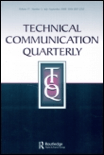
Technical Communication Quarterly
Scope & Guideline
Elevating Research in Technical Communication Practices
Introduction
Aims and Scopes
- Social Justice and Equity in Communication:
The journal consistently addresses issues of justice, equity, diversity, and inclusion (JEDI), focusing on how these themes influence technical and professional communication practices across various contexts. - Methodological Innovations:
TCQ emphasizes innovative methodologies for research in technical communication, including qualitative, quantitative, and mixed methods approaches that engage with contemporary challenges in the field. - Interdisciplinary Perspectives:
The journal encourages interdisciplinary research, integrating insights from fields such as rhetoric, sociology, technology studies, and environmental studies to enrich the understanding of technical communication. - Focus on Emerging Technologies:
TCQ explores the implications of emerging technologies on communication practices, including digital literacy, data usability, and artificial intelligence, highlighting their impact on professional communication. - Critical Analysis of Professional Practices:
The journal provides critical analyses of professional communication practices, examining how factors such as race, gender, and socio-economic status shape communication in various professional contexts.
Trending and Emerging
- Integration of Social Justice Frameworks:
Recent publications increasingly emphasize the integration of social justice frameworks within technical communication, reflecting a growing commitment to equity and inclusion in the field. - Health Communication in Crisis Contexts:
The COVID-19 pandemic has catalyzed a surge of research focused on health communication, particularly in crisis contexts, highlighting the importance of effective communication strategies in public health. - Data Usability and Visualization:
There is a rising focus on data usability and visualization, with researchers exploring how to effectively communicate complex data to diverse audiences, which is crucial in our data-driven society. - Community-Engaged Research:
Emerging themes emphasize community-engaged research methodologies, reflecting a shift towards collaborative approaches that prioritize community voices and needs in technical communication. - Digital Literacy and Pedagogy:
The journal is increasingly addressing issues related to digital literacy and innovative pedagogical approaches in technical communication education, responding to the demands of a rapidly evolving digital landscape.
Declining or Waning
- Traditional Technical Writing:
There seems to be a waning interest in conventional technical writing practices, with fewer papers addressing standard documentation techniques and formats, as the field shifts towards more dynamic and participatory forms of communication. - Focus on Print Media:
With the rise of digital communication, topics related to print media and traditional publishing methods have become less frequent, indicating a shift towards digital and multimedia communication strategies. - Narrowly Defined Audience Studies:
Research focused on narrowly defined audience studies appears to be decreasing, as broader, more inclusive approaches to audience analysis gain traction, reflecting the need for diverse perspectives in technical communication. - Static Rhetorical Models:
There is a noticeable decline in the application of static rhetorical models, as scholars increasingly seek dynamic and context-sensitive approaches to understanding rhetoric in technical communication.
Similar Journals

Jurnal Komunikasi-Malaysian Journal of Communication
Advancing Knowledge in Communication StudiesJurnal Komunikasi-Malaysian Journal of Communication is a premier, peer-reviewed journal published by the NATIONAL UNIVERSITY OF MALAYSIA, FACULTY OF SOCIAL SCIENCES & HUMANITIES. With an ISSN of 2289-151X and an E-ISSN of 2289-1528, this journal focuses on diverse aspects of communication theory and practice, particularly within the Malaysian context. As a significant contributor to the field, it has established itself with a respectable impact factor and currently holds a Q3 ranking in the Communication category per the 2023 Scopus Quartiles. The journal is dedicated to fostering scholarly discourse and advancing knowledge in communication studies, encompassing an array of topics from interpersonal communication to mass media impact. Since its inception, it has been committed to maintaining high academic standards while providing an engaging platform for researchers, professionals, and students. With converged years from 2014 to 2024, Jurnal Komunikasi continues to address emerging trends and challenges in communication, making it an invaluable resource for those seeking to deepen their understanding and engagement with the discipline.

Communication & Society-Spain
Connecting Theories and Practices in Communication StudiesCommunication & Society-Spain, published by Universidad de Navarra, is an esteemed open access journal dedicated to advancing scholarship in the dynamic fields of communication and cultural studies. Since its inception in 1988, the journal has maintained a commitment to disseminating high-quality research that engages with contemporary issues and contributes to the evolving discourse around communication theories and practices. With a commendable Q1 ranking in both Communication and Cultural Studies categories, it stands as a prominent source for researchers and professionals alike, reflecting its robust presence in the academic community—evidenced by its Scopus rankings placing it in the top percentiles within both fields. The journal's scope encompasses diverse perspectives and methodologies, thereby fostering interdisciplinary dialogue essential for understanding the complexities of communication in society. With a publication history that spans from 2010 to 2024 and a ranking of #87 out of 1304 in Cultural Studies, our commitment to open access ensures that impactful research is readily available to all, promoting further scholarly engagement and innovation.

Journal of Information Communication & Ethics in Society
Navigating the Ethical Frontiers of CommunicationJournal of Information Communication & Ethics in Society is a premier interdisciplinary journal published by Emerald Group Publishing Ltd, dedicated to exploring the critical intersections of technology, communication, and ethical practices within contemporary society. With an ISSN of 1477-996X and an E-ISSN of 1758-8871, this journal has established itself as a significant platform for scholarship since its inception in 2003, converging its themes into accessible and impactful research up to 2024. Indexed in leading databases, it holds impressive Scopus rankings, notably in the Q1 category for Philosophy and Q2 in Communication and Sociology, highlighting its relevance and influence within the academic community. Although currently not fully open access, the journal provides vital insights and discussions that are highly applicable across various fields, making it an essential resource for researchers, professionals, and students alike who are keen to navigate the complexities of communication ethics in the digital age. Addressing pressing societal concerns, the journal encourages robust dialogue regarding the ethical implications of information communication technologies, cementing its importance in fostering responsible practices that resonate within academia and industry.
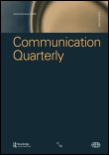
COMMUNICATION QUARTERLY
Unveiling Nuances in Human InteractionCOMMUNICATION QUARTERLY, published by Routledge Journals, Taylor & Francis Ltd, serves as a vital resource in the field of communication studies. With an ISSN of 0146-3373 and an E-ISSN of 1746-4102, this esteemed journal has been contributing to the academic discourse since its inception in 1976 and is projected to continue until 2024. Ranked Q2 in the 2023 category of Communication, it holds a respectable position in the social sciences with Scopus ranking #180 out of 511, placing it in the 64th percentile. Although it is not an Open Access journal, COMMUNICATION QUARTERLY offers a wealth of peer-reviewed articles that delve deep into nuanced theories, empirical studies, and critical analyses relevant to contemporary communication challenges. Targeted towards researchers, professionals, and students alike, this journal is essential for anyone seeking to enhance their understanding and engagement with significant issues in the communication field.
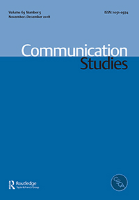
Communication Studies
Pioneering Insights in Communication StudiesCommunication Studies is a premier journal dedicated to advancing the field of communication, published by Routledge Journals, Taylor & Francis Ltd in the United Kingdom. With an ISSN of 1051-0974 and an E-ISSN of 1745-1035, this journal has established itself as a pivotal platform for scholarly work since its inception in 1989. As a member of the esteemed Q1 quartile in communication for 2023, it ranks within the top echelons of the Scopus database, placed at #106 out of 511 in social sciences communication, signaling its influential contribution in the field, with a striking 79th percentile ranking. The journal publishes original research, theoretical discussions, and critical reviews that address various aspects of communication processes and practices, making it invaluable for researchers, professionals, and students who wish to stay abreast of the latest developments. While it currently does not offer Open Access options, its extensive reach and rigorous peer-review process ensure the publication of high-quality, impactful research. For inquiries, the editorial office can be contacted at 2-4 Park Square, Milton Park, Abingdon OX14 4RN, Oxon, England.
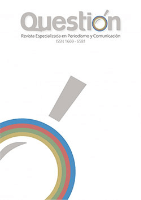
Question
Transforming ideas into impactful communication research.Question is a premier open-access journal published by UNIV NACIONAL PLATA, INST INVESTIGACIONES & COMUNICACION-IICOM, dedicated to advancing scholarship in the field of communication and journalism. Since its inception in 2005, this journal has served as a vital platform for researchers, professionals, and students to disseminate innovative research findings and theoretical discussions that shape contemporary communication practices. Operating out of La Plata, Buenos Aires, Argentina, it engages a global audience by addressing critical topics within communications, including media studies, social communication, and the impact of digital technologies. With its robust commitment to open access, Question ensures that its high-quality content is freely available, fostering a collaborative academic environment and broadening the reach of research in the communications discipline. As a valuable resource, this journal stands at the intersection of academia and practice, inviting contributions that push the boundaries of knowledge in communication.

TECHNICAL COMMUNICATION
Bridging Gaps with Insightful Communication PracticesTECHNICAL COMMUNICATION is a prestigious journal dedicated to the field of communication, particularly focusing on the disciplines of technical and professional communication. Published by the SOCIETY FOR TECHNICAL COMMUNICATION in the United States, this journal serves as a critical platform for researchers, practitioners, and educators interested in the intersection of technology and effective communication strategies. With an impressive Q1 ranking in both the Communication and Social Sciences categories as of 2023, it is recognized for its contribution to advancing knowledge and innovation within these domains. Over its publication history, from 1973 to 2024, TECHNICAL COMMUNICATION has continually facilitated the dissemination of scholarly work and practical applications, fostering engagement and collaboration among professionals in the field. Although it is not an open-access journal, the insightful research and discussions contained within its pages make it an invaluable resource for those dedicated to enhancing communication effectiveness in various contexts. Researchers, professionals, and students alike will find this journal instrumental in staying abreast of the latest trends and best practices in technical communication.

CANADIAN JOURNAL OF INFORMATION AND LIBRARY SCIENCE-REVUE CANADIENNE DES SCIENCES DE L INFORMATION ET DE BIBLIOTHECONOMIE
Empowering scholars through impactful research.Canadian Journal of Information and Library Science - Revue Canadienne des Sciences de l'Information et de Bibliothéconomie is a notable peer-reviewed journal dedicated to the fields of information science and library studies, published by Western Libraries. Since its inception in 1993, this journal has served as a crucial platform for disseminating high-quality research and insights into library practices, information management, and the evolving roles of information professionals. With an impact factor that reflects its standing within the academic community, it currently holds Q4 status in Information Systems and Q3 in Library and Information Sciences for 2023, indicating a growing influence in its fields. Although the journal operates without Open Access options, it remains accessible to those affiliated with institutions that support its research mission. Scholars, practitioners, and students alike are encouraged to engage with the rich content provided in this journal, which sits within the Social Sciences and Computer Science domains, making it an essential resource for advancing scholarly discourse and practical applications in the continuously evolving landscape of information and library science.
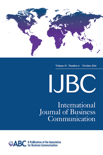
International Journal of Business Communication
Empowering Research in Business Communication ExcellenceInternational Journal of Business Communication is a distinguished academic platform published by SAGE Publications Inc that serves as a vital resource for researchers, professionals, and students in the fields of Business, Management, Economics, and related disciplines. With its ISSN 2329-4884 and E-ISSN 2329-4892, the journal has attained a prestigious Q1 category status in both business and economics, placing it among the top-tier publications in these sectors. Its impressive Scopus ranking—15th in Economics and 18th in Business—reflects its significance and influence, evidenced by its remarkable performance in the 94th and 90th percentiles respectively. The journal spans from 2015 to 2024, offering comprehensive insights into contemporary business communication practices, theories, and technologies essential for thriving in today's dynamic environments. Although it is not open access, the knowledge contained within its articles is invaluable for advancing understanding and fostering innovation in business communication.
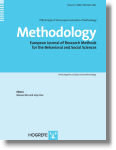
Methodology-European Journal of Research Methods for the Behavioral and Social Sciences
Innovating methodologies for tomorrow's social science research.Methodology-European Journal of Research Methods for the Behavioral and Social Sciences is a premier, open access journal dedicated to advancing the field of research methods within the behavioral and social sciences. Published by PSYCHOPEN, this journal plays a vital role in disseminating innovative methodologies and rigorous research designs to foster scholarly communication among researchers, professionals, and students. With an impact factor reflecting its credibility and relevance—categorized within the Q2 in Psychology and Q1 in Social Sciences in 2023—this journal ensures that contemporary scientific practices are at the forefront of academic discourse. With its origins dating back to 2005, Methodology is committed to providing free and unfettered access to its contributions, encouraging wide-reaching application and replication of research findings. Located in Trier, Germany, the journal is a cornerstone for those aiming to enhance their research skills and appreciate the nuanced complexities involved in behavioral and social investigations.